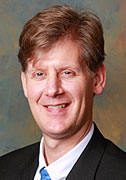 Dr. Paul Wolters, Director of Biological Research for the Interstitial Lung Disease Program at University of California San Francisco (UCSF) will host a live, free webinar on Thursday, November 13, 2014 at 10:00 a.m. PST. His presentation, entitled “Emerging Therapies in Pulmonary Fibrosis: Their Relevance for Scleroderma Patients,” is designed to educate a broad audience on the importance of diagnosis and of early management of this complication for scleroderma patients.
Dr. Paul Wolters, Director of Biological Research for the Interstitial Lung Disease Program at University of California San Francisco (UCSF) will host a live, free webinar on Thursday, November 13, 2014 at 10:00 a.m. PST. His presentation, entitled “Emerging Therapies in Pulmonary Fibrosis: Their Relevance for Scleroderma Patients,” is designed to educate a broad audience on the importance of diagnosis and of early management of this complication for scleroderma patients.
Scleroderma, or systemic sclerosis, is a chronic connective tissue disease generally classified as one of the autoimmune rheumatic diseases. The word scleroderma comes from two Greek words: sclero meaning hard, and derma meaning skin. Hardening of the skin is one of the most visible manifestations of the disease, but it much more often affects the internal organs with life-threatening consequences. According to the Scleroderma Foundation, Scleroderma is considered a rare autoimmune disease but an estimated roughly 300,000 Americans have scleroderma — about one-third of those people having the systemic form of the disease, and has one of the highest mortality rates of the rheumatic diseases.
 Women comprise 80% of the patient population with typical onset between the ages of 20 and 50. Scleroderma is characterized by widespread vascular abnormalities, immune dysregulation and fibrotic complications affecting multiple organs including the skin and lung. The disease is not contagious or directly hereditary and scientists are still searching for possible causes. There is no known cure and current therapies address various symptoms rather than truly arresting disease progression.Since scleroderma presents with symptoms similar to other autoimmune diseases, diagnosis is difficult. There may be many misdiagnosed or undiagnosed cases.
Women comprise 80% of the patient population with typical onset between the ages of 20 and 50. Scleroderma is characterized by widespread vascular abnormalities, immune dysregulation and fibrotic complications affecting multiple organs including the skin and lung. The disease is not contagious or directly hereditary and scientists are still searching for possible causes. There is no known cure and current therapies address various symptoms rather than truly arresting disease progression.Since scleroderma presents with symptoms similar to other autoimmune diseases, diagnosis is difficult. There may be many misdiagnosed or undiagnosed cases.
The SRF Webinar Series, sponsored by United Therapeutics and Gilead Sciences is a free service to help patients, physicians, family members, friends, and others in the scleroderma community to better understand scleroderma. The Webinars feature guest speakers ranging from experts in the research community to leading physicians who treat scleroderma patients. Webinars will be broadcast live and also recorded for later viewing on the SRF website.
Each SRF Webinar lasts approximately one hour. A question and answer session is available via chat functionality at the conclusion of each presentation. Webinars are free for all participants but require online registration, Internet access and a telephone (for audio). A toll-free number is provided for U.S. and Canadian attendees.
[adrotate group=”8″]
Dr. Paul J. Wolters is a pulmonologist and Director of Biological Research for the Interstitial Lung Disease Program at University of California San Francisco. He specializes in connective tissue disorders and their involvement in the lung, and is co-founder of the Interstitial Lung Disease Program at UCSF, as well as co-director of the Northern California Scleroderma Research Consortium. Dr. Wolters’ research program is directed toward understanding the molecular pathogenesis of fibrotic lung disease and using this knowledge to develop novel therapies for treating these diseases.
According to Dr. Wolters, commenting in a Scleroderma Research Foundation release, “The field of fibrosis research is progressing rapidly. Two new drugs have been shown this past year to slow progression of lung fibrosis, proving that it can be effectively treated. By advancing the understanding of the molecular causes of fibrosis, new therapies for scleroderma should be developed in the near future.”
Dr. Wolters’ webinar is the 16th in an ongoing free educational series available live or post-broadcast on the Scleroderma Research Foundations website at:
http://www.SRFcure.org
The series is made possible by support from Gilead Sciences and United Therapeutics. The Wolters Webinar will be presented Thursday, November 13, 2014 at 10:00 a.m. PST.
The Scleroderma Research Foundation is America’s first and leading nonprofit investor in scleroderma research. It was founded in San Francisco in 1987 by scleroderma patient Sharon Monsky who lost her battle to the disease in 2002. MS. Monsky’s legacy lives on through the organization, chaired by Luke Evnin, Ph.D., a scleroderma patient and managing partner of MPM Capital, a dedicated investor in life sciences.
The Foundation’s collaborative approach is guided by a world-class Scientific Advisory Board and is empowering scientists from leading institutions to work together to develop an understanding of how scleroderma begins, how it progresses and what can be done to slow, halt or reverse the disease process.
The SRF funds research investigators at some of the top universities in the United States and abroad, including Dartmouth, Harvard, Johns Hopkins, Royal Free and University College in the UK, Stanford University, Northwestern, Boston University, the University of Michigan, the University of Washington and others. Led by a Scientific Advisory Board comprised of some of the most highly-regarded scientists in the country, the SRF’s research program brings together experts from the fields of immunology and vascular biology as well as cutting-edge technology for the benefit of scleroderma patients.
The SRF continues to lead the way in funding scleroderma research. It has maintained its position as the single largest nonprofit funding source for scleroderma research and devotes a greater percentage of its annual budget to scleroderma research, more than any other nonprofit organization. In the fiscal year ending 2013, the SRF funded more than $1,000,000 in direct research grants.
For more information, visit:
http://www.srfcure.org/for-patients/webinars
Sources:
Scleroderma Research Foundation
Image Credit:
Scleroderma Research Foundation

